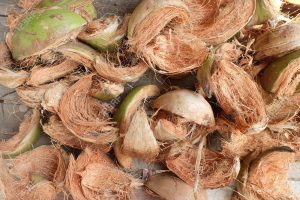Home News Over 500 coconut farmers affected by oil mill shutdown
…persons fear grave economic hardships – farmers association
After being fined $1 million by the Environmental Protection Agency (EPA) for dumping coconut waste into tributaries of the Pomeroon River, the coconut oil factory has decided to shut down operations, affecting the livelihood of over 500 farmers.
The EPA had imposed a $1 million penalty for dumping shells and husks into canals, which lead into the river, located in Region Two (Pomeroon-Supenaam). Fat Boy Coconut Ventures, which is managed by Alphonso and Sons Enterprise, was required to pay the $1 million penalty for dumping an estimated 15,000 coconut shells.
President of the Pomeroon Coconut Farmers Association, Glenrick Ali told Guyana Times that operations have ceased and many foresee grave economic hardships. He added that since the penalty was imposed last month, there has been no long-term alternative to get rid of the waste materials generated.
The Government Analyst Food and Drug Department would have to intervene, advising the company on the dynamics of disposing the materials on land since there are complications with infestation from pests and rodents. As customary, the company would extract and bottle the coconut water but does not utilise the jelly pulp, which is discarded with the husky outer shell.
“It would be great economic hardship for now until they resume and we don’t know when. They might pay [the fine] but they still have to find an alternative means to dispose of the husk. They could put it on land but the Food and Drug Department would have to tell them what distance away from the bottling facility the husk would have to be disposed. As it rot, it would gather flies, roaches and so on. The company does not make use of the jelly so that would gather insects very fast,” said Ali.
For now, operations are suspended and many farmers have lost their livelihood along with other employees of the factory. The President of the farmers’ association was convinced that the closed facility was the most dynamic in the Caribbean, processing 15,000 nuts per day. Now, only one other bottling facility remains, which cannot ease the current production rate.
“There is one other bottling facility operating presently. This facility that’s closing processes 15,000 nuts per day for last month. It is the best because it is the only one with the capacity to process that many nuts per day. The closure would affect over 500 farmers and their families and the facility employs about 30 persons so they would be without jobs until they open again and we don’t know when,” he posited. 
Efforts to contact Alphonso and Sons Enterprise for an update on how soon the company will pay the fine proved futile.
In a previous report, the EPA had stated that shells and husks are a major contributor to flooding and more so, it poses a hazard to the waterways, since residents rely on the water for daily activities.
Officers of the EPA had visited the area and had warned of the consequences if the company did not desist from dumping the waste. This reportedly continued and as such, the sanctions were imposed. The company had agreed to pay the fine within 30 days, which expired on July 31.
Just over one year ago, the pronouncement was made to revive Guyana’s coconut industry and create value-added products for the international market. Consultations were done with farmers and many sought resources to get involved. Some had already owned acres of coconut plants which required attention to produce favourable results. On the other hand, entrepreneurs ventured into the manufacturing sector to bottle the water.
Chief Executive Officer of National Agricultural Research and Extension Institute (NAREI), Dr Oudho Homenauth had told officials of Region Two (Pomeroon-Supenaam) that the budding coconut industry can be a major contributor to economic development of the region through the development of more coconut-based products because, as he highlighted, every part of the coconut can be used for one purpose or another.
